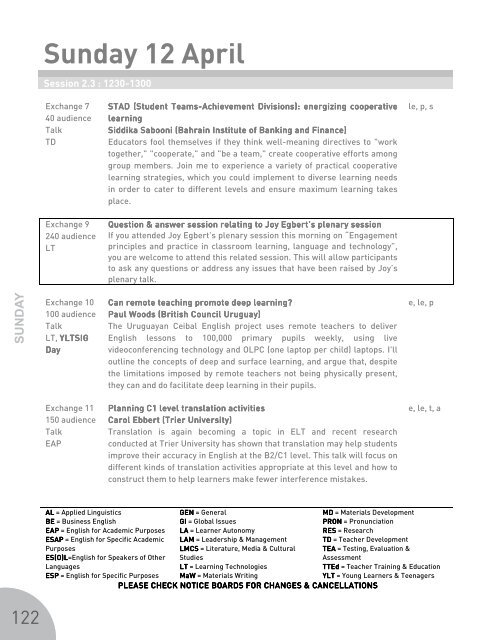You also want an ePaper? Increase the reach of your titles
YUMPU automatically turns print PDFs into web optimized ePapers that Google loves.
Sunday 12 April<br />
Session 2.3 : 1230-1300<br />
Exchange 7<br />
40 audience<br />
Talk<br />
TD<br />
STAD (Student Teams-Achievement Divisions): energizing cooperative<br />
learning<br />
Siddika Sabooni (Bahrain Institute of Banking and Finance)<br />
Educators fool themselves if they think well-meaning directives to "work<br />
together," "cooperate," and "be a team," create cooperative efforts among<br />
group members. Join me to experience a variety of practical cooperative<br />
learning strategies, which you could implement to diverse learning needs<br />
in order to cater to different levels and ensure maximum learning takes<br />
place.<br />
le, p, s<br />
Exchange 9<br />
240 audience<br />
LT<br />
Question & answer session relating to Joy Egbert’s plenary session<br />
If you attended Joy Egbert’s plenary session this morning on “Engagement<br />
principles and practice in classroom learning, language and technology”,<br />
you are welcome to attend this related session. This will allow participants<br />
to ask any questions or address any issues that have been raised by Joy’s<br />
plenary talk.<br />
SUNDAY<br />
Exchange 10<br />
100 audience<br />
Talk<br />
LT, YLTSIG<br />
Day<br />
Can remote teaching promote deep learning?<br />
Paul Woods (British Council Uruguay)<br />
The Uruguayan Ceibal English project uses remote teachers to deliver<br />
English lessons to 100,000 primary pupils weekly, using live<br />
videoconferencing technology and OLPC (one laptop per child) laptops. I'll<br />
outline the concepts of deep and surface learning, and argue that, despite<br />
the limitations imposed by remote teachers not being physically present,<br />
they can and do facilitate deep learning in their pupils.<br />
e, le, p<br />
Exchange 11<br />
150 audience<br />
Talk<br />
EAP<br />
Planning C1 level translation activities<br />
Carol Ebbert (Trier University)<br />
Translation is again becoming a topic in ELT and recent research<br />
conducted at Trier University has shown that translation may help students<br />
improve their accuracy in English at the B2/C1 level. This talk will focus on<br />
different kinds of translation activities appropriate at this level and how to<br />
construct them to help learners make fewer interference mistakes.<br />
e, le, t, a<br />
AL = Applied Linguistics<br />
BE = Business English<br />
EAP = English for Academic Purposes<br />
ESAP = English for Specific Academic<br />
Purposes<br />
ES(O)L=English for Speakers of Other<br />
Languages<br />
ESP = English for Specific Purposes<br />
GEN = General<br />
GI = Global Issues<br />
LA = Learner Autonomy<br />
LAM = Leadership & Management<br />
LMCS = Literature, Media & Cultural<br />
Studies<br />
LT = Learning Technologies<br />
MaW = Materials Writing<br />
MD = Materials Development<br />
PRON = Pronunciation<br />
RES = Research<br />
TD = Teacher Development<br />
TEA = Testing, Evaluation &<br />
Assessment<br />
TTEd = Teacher Training & Education<br />
YLT = Young Learners & Teenagers<br />
PLEASE CHECK NOTICE BOARDS FOR CHANGES & CANCELLATIONS<br />
122


